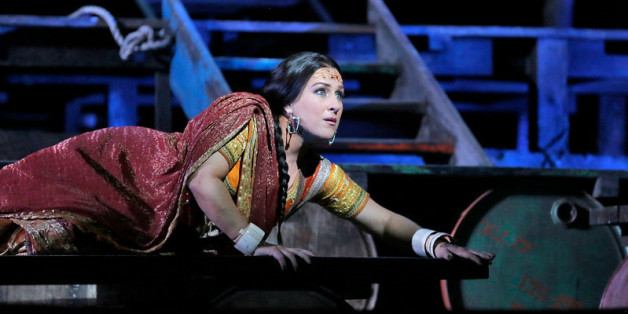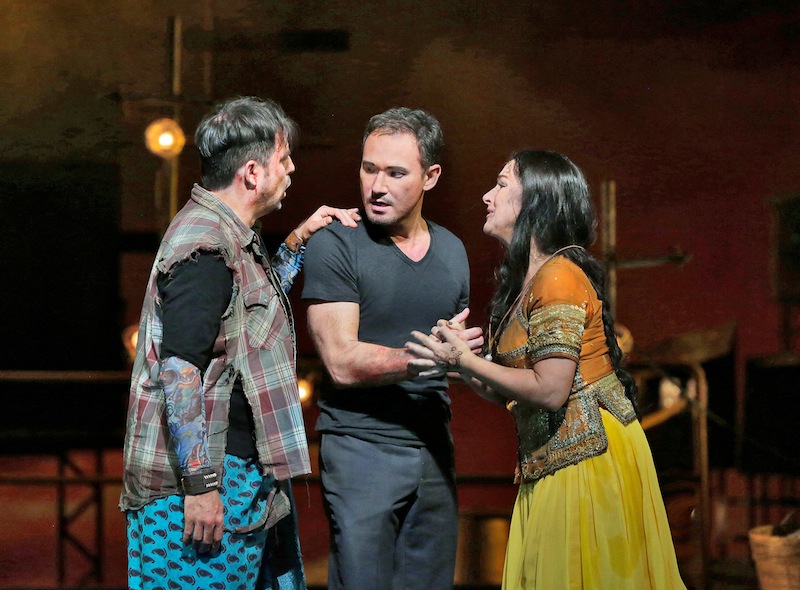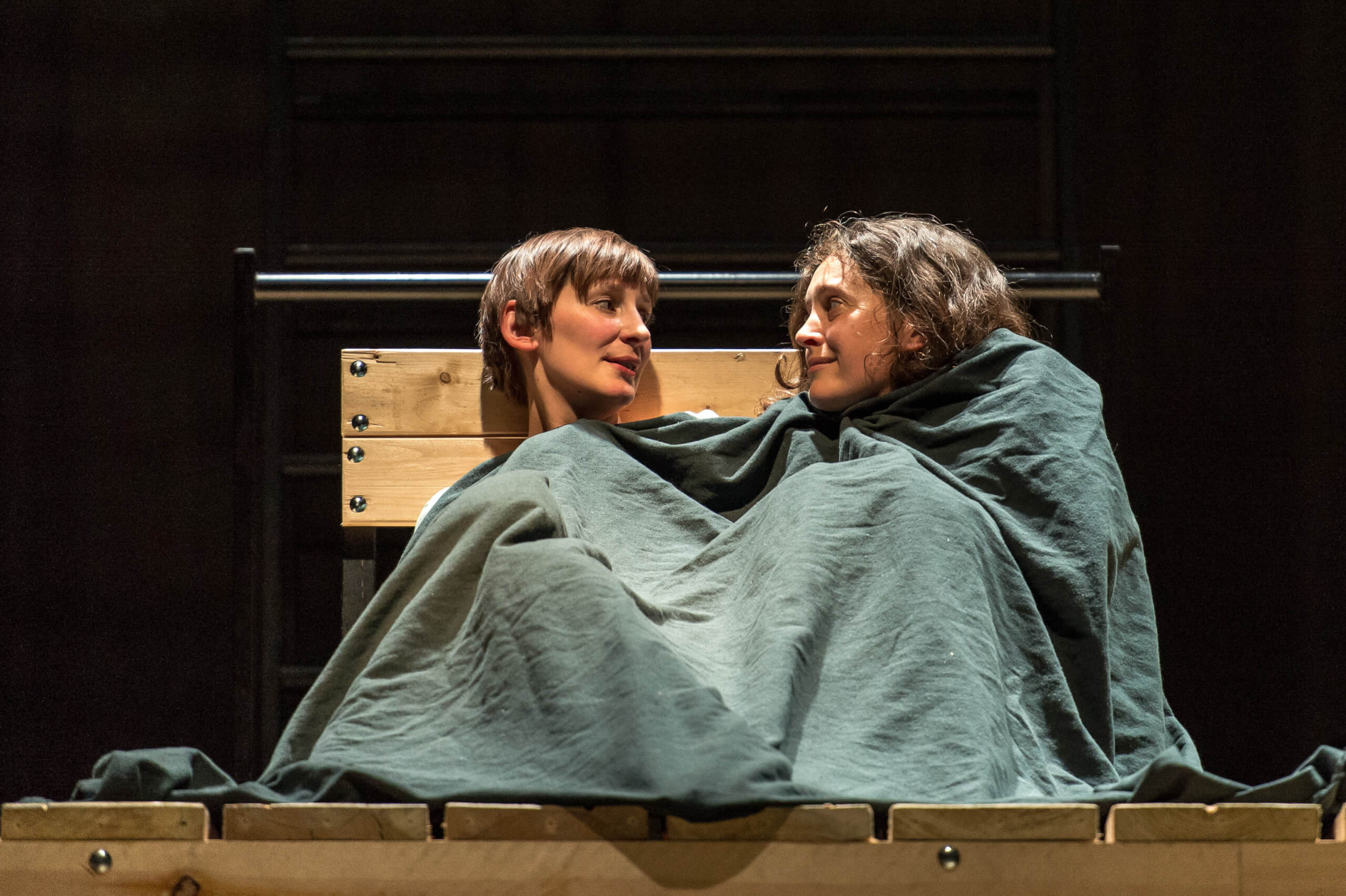 |
| Simon Keenlyside as Don Giovanni © Marty Sohl/ Met Opera photography. |
His much-anticipated performance for many of his fans, including myself, was a simulcast, broadcasted to all around the globe. It is not the first time Keenlyside has had to sing as the Don in Michael Grandage’s dark and, often considered, lifeless staging.
Set in Spain in the early 18th century, a first-class cast including Hibla Gerzmava, Malin Byström, Serena Malfi, Adam Plachetka, Paul Appleby and Matthew Rose, gave way to a musically hypnotising and exciting work of scandalous drama - betrayal, deceit, and revenge. And let’s not forget – there’s plenty of womanizing from Giovanni.
 |
| © Marty Sohl/ Met Opera photography. |
Last night Keenlyside proved that he had mastered the role of Giovanni. He has the ability to display both a vulgar and licentious Giovanni to his servant Leporello whilst presenting a more polished Spanish gentlemen to others, including the noblemen and ladies he intends on wooing.
Many love the opera, Don Giovanni, for various reasons. Some believe that Mozart wrote it grieving the death of his father, which happened a year before the premiere of the opera. According to them, this generated his creative urge, making it a touch more personal to him. Other sources say he completed the overture the night before it premiered.
Despite the grey and unimaginative background, there’s much to enjoy in this Met production including the harmonious key structure and the musical symmetries which are tightly executed by the Met Orchestra under the baton of versatile conductor Fabio Luisi (well, at least from what I heard from the screens of Wimbledon’s Curzon cinema.) Luisi commanded a lyrical and yet powerful introduction to this performance, and the Met Orchestra performed with precision, paying particular attention to tempi and retaining full force for pivotal moments. The D minor chords from the overture and the supper scene, distinctively highlighting the Commendatore and the authority of moral justice, is just an example of one of these crucial moments.
 |
| Paul Appleby and Hibla Gerzmava as Don Ottavio and Donna Anna © Marty Sohl/ Met Opera photography. |
Plachetka did a tremendous job as Giovanni’s desperate servant. He seemed particularly at home singing the catalogue aria where he tells Don Elvira of the 1,003 Spanish, 640 Italians, 231 Germans, 100 French and 91 Turkish women he had seduced. Plachetka’s characterisation is inward thinking, constantly questioning the lack of morality of his employer, and at one point seeks to quit and leave, yet he’s won over by the four coins of gold which Keenlyside drops on the floor like crumbs of bread. A rotten scoundrel and deceiver Giovanni is, he points the finger at Leporello when he doesn’t succeed in getting his way with country, newbie bride Zerlina. Keenlyside’s Giovanni is cold, he has no merci for those that try to get in the way of what he desires.
Malin Byström deserves a salute for her challenging role as Giovanni’s former conquest Don Elvira. Her singing reflected the heartbreak and disappointment of Giovanni, so there was sheer gusto to her performance with vocal fluidity, which shined throughout the night.
 |
| Adam Plachetka and Malin Byström as Leporello and Donna Elvira. © Marty Sohl/ Met Opera photography. |
Donna Anna was gorgeously sung by Hibla Germzmava. She was absolutely astonishing. It was the first time I had seen her perform, and I’d love to her again in another coloratura role - she’d definitely hit the mark. You could sympathize with her Donna Anna who had not only been subjected to a horrifying rape attempt but saw her father’s blood drip to the ground.
Her fiancé Don Ottavio was performed by Paul Appleby, and he gave an entirely unique act. Don Ottavio’s character is usually written to be wet and weedy as he swears revenge to Donna Anna. Don Ottavio sings 'if she sighs, I too must sigh', and is usually conceived as a bore, yet Appleby revolutionizes Ottavio and makes him stronger and almost alpha-like. Mozart gave him beautiful music, which is the direct opposite to the lustful music of Giovanni, and Appleby more than complements this. When he sang Il mio Tesoro, he was a joy to listen to – I felt musically seduced.
Singing was pretty seamless last night, yet the camera work was poor, I’m afraid. There were several tweets from cinema viewers complaining there was a lack of surtitles and sound. For me, the serenading song to Don Elvira's maid can easily capture the heart of anyone, however, for those sat in front of a cinema screen, the camera director decided to focus the singing on Keenlyside as oppose to the discreet and curious maid behind the curtain, which would have produced a much more lustrous and sensitive touch to the scene. Shame on them!
Other favourite scenes include the astonishing scene where there were two different dances happening at the end of the first act. The music is distinctive, and you can tell the difference between the peasants' dance versus the noble. All characters are on stage, from country dancing to a waltz and a minuet. There's also the sextet in act II which reaches a climax and everyone admits to being confused as to who the man is in front of them is. We know it is Leporello, but he is dressed as the Don. Disguised or not, in the face of god, we are all judged for our moral and immoral behaviour. Viva la liberty!
More information about the HD Cinema showing is here. In New York it is still available at the Metropolitan until May 11th 2017. The next showing is on November 4th. Click here to purchase tickets. Next viewing of Met HD is L'Amour de Loin on December 10th. More information here.
This blog post continues from a post I wrote about Keenlyside in December 2014. Click here to acces it.
This blog post continues from a post I wrote about Keenlyside in December 2014. Click here to acces it.






















